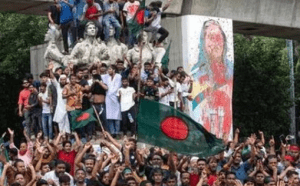New Delhi/Dhaka, April 19, 2025 – A new wave of diplomatic friction has emerged between India and Bangladesh following the targeted killing of Shyamlal Roy, a prominent Hindu leader and human rights activist, in Dhaka. Roy, known for his vocal stance on minority safety, was found dead with multiple stab wounds near his residence in the Mirpur district, sending shockwaves through both nations.
The incident has sparked widespread outrage across India and triggered immediate condemnation from the Indian government, which summoned the Bangladeshi High Commissioner in New Delhi to lodge a formal diplomatic protest. In a strong-worded statement, the Ministry of External Affairs (MEA) urged the Bangladeshi authorities to uphold constitutional commitments to minority communities and take urgent legal and security action.
Who Was Shyamlal Roy?
Shyamlal Roy, aged 52, was the General Secretary of the Hindu Welfare Federation of Bangladesh and an active campaigner against religious discrimination. Over the last decade, he had become a key figure advocating for the safety of Hindus, who comprise nearly 8% of Bangladesh’s population. He had previously survived an assassination attempt in 2021 and continued to report threats against him in the weeks leading up to his death.
According to his family and colleagues, Roy had submitted multiple complaints to local authorities citing harassment and threats from radical groups, but no preventive action was taken. His death has reignited concerns over the deteriorating conditions for religious minorities in Bangladesh.
India’s Official Response: ‘Grave Violation of Rights’
India’s response was immediate and assertive. In a press briefing held on Friday, MEA spokesperson Randhir Jaiswal expressed deep concern:
“This heinous crime is not just an attack on an individual but an assault on the values of pluralism and inclusiveness. The Government of India expects Bangladesh to live up to its responsibility to protect all communities under its jurisdiction, particularly minorities who remain vulnerable to such targeted violence.”
India also called for the deployment of special investigative units to probe the murder and for enhanced police protection in Hindu-dominated areas of Bangladesh.
Domestic Reaction in India: Protests and Political Outrage
Political leaders across party lines in India have spoken out against the incident. BJP spokespersons accused the Bangladeshi government of “turning a blind eye” to extremist forces, while Congress and AAP leaders urged the central government to pursue a multilateral international response.
Massive protests erupted in Kolkata, Guwahati, Delhi, and other cities with significant Bengali Hindu populations. Demonstrators chanted slogans against religious intolerance and demanded that international human rights organizations take up the issue.
Human rights activists and legal groups are also pushing for India to raise the matter at the United Nations Human Rights Council (UNHRC).
Bangladesh Government’s Stand
 In response to India’s statement and mounting global attention, the Bangladeshi Home Ministry confirmed that a three-member special investigation team has been constituted to look into the murder. Interior Minister Asaduzzaman Khan described the killing as “deeply unfortunate” and promised that the perpetrators would be “brought to book.”
In response to India’s statement and mounting global attention, the Bangladeshi Home Ministry confirmed that a three-member special investigation team has been constituted to look into the murder. Interior Minister Asaduzzaman Khan described the killing as “deeply unfortunate” and promised that the perpetrators would be “brought to book.”
However, critics argue that similar promises have been made in the past without significant progress. Several Hindu activists claim that many cases of hate crimes and mob violence against minorities remain unresolved.
Context: Rising Pattern of Violence
Roy’s murder is not an isolated case. In the last five years, Bangladesh has witnessed a notable increase in attacks on Hindu temples, idols, and community leaders. According to Ain o Salish Kendra (ASK), a Bangladeshi human rights watchdog, more than 1,200 cases of violence against Hindus have been recorded since 2020.
Many of these incidents occurred during religious festivals such as Durga Puja, when mobs attacked temples under the pretext of “blasphemy.” The pattern, observers say, indicates a rise in radicalism and a weakening of law enforcement mechanisms to protect minorities.
Strategic Implications for Indo-Bangla Relations
This event adds strain to an already sensitive bilateral relationship. While India and Bangladesh have maintained strong economic and infrastructural ties, issues of minority safety, border killings, and illegal migration have frequently disrupted diplomatic harmony.
Experts believe that India’s current push for stronger minority protections in its neighborhood is part of a broader foreign policy strategy that emphasizes regional democratic values and religious freedom.
Conclusion
As India demands accountability and justice for the murder of Shyamlal Roy, the spotlight now shifts to Dhaka. Will the Bangladeshi government act decisively or allow the growing pattern of minority persecution to fester? For now, diplomatic pressure is mounting — and both nations must tread carefully to balance justice, regional peace, and internal harmony.
Official Source: Ministry of External Affairs – Official Statement Archive
For more real time info, visit Channel 6 Network.

